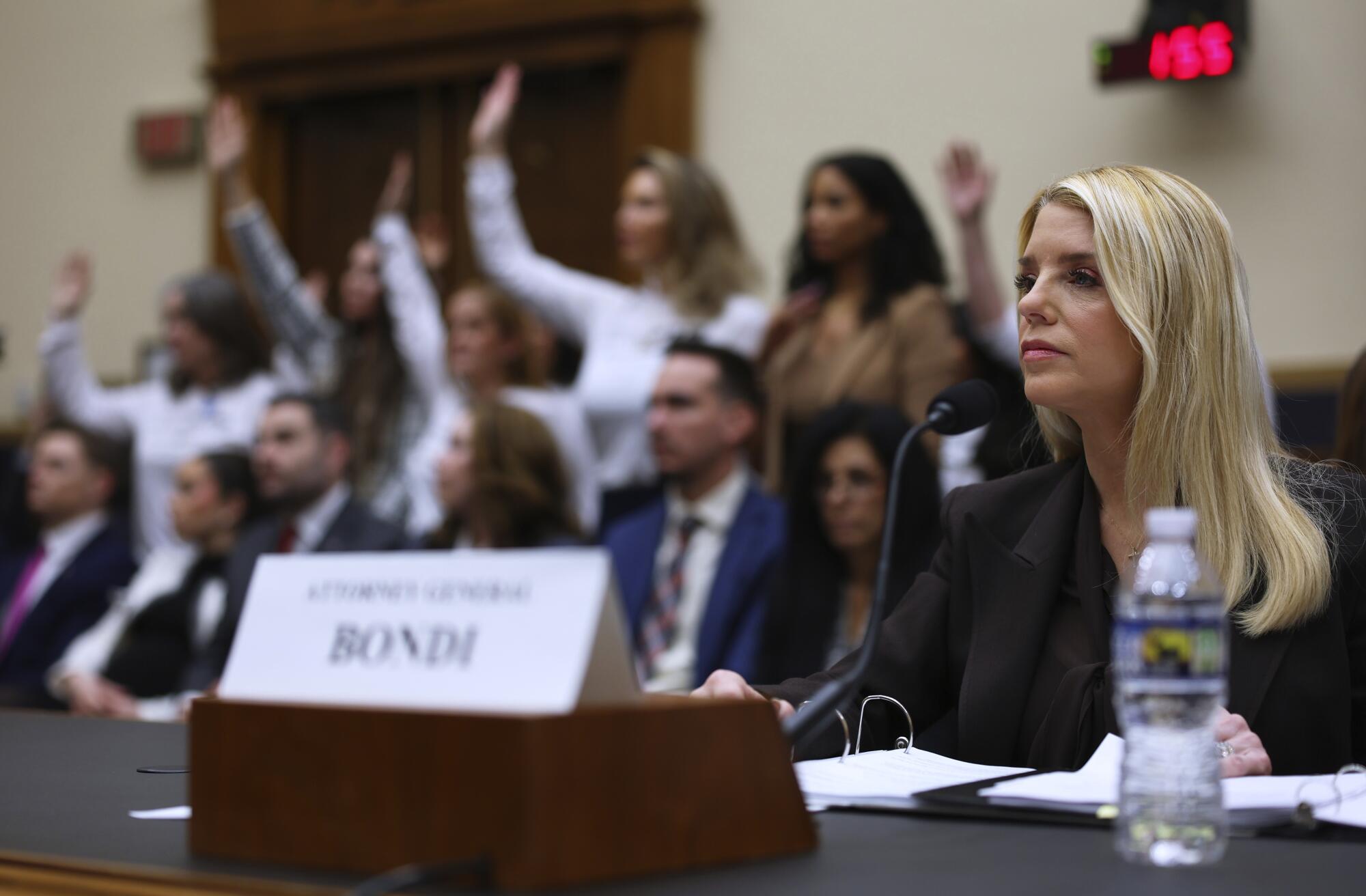The unintended hilarity of Pam Bondi’s finger-wagging testimony
The nation faces some tough questions following the unwittingly hilarious performance of U.S. Atty. Gen. Pam Bondi when she testified before the House Judiciary Committee on Wednesday about the Justice Department’s handling of the Epstein files, among other things.
Viewers were left asking themselves if the over-the-top dramatics they witnessed were in fact a midweek “SNL” comedy sketch, with Amy Poehler playing Bondi. But on second thought, no one is better at playing the Entitled Mean Girl than Bondi herself.
Deflecting from questions about the DOJ’s mishandling of the Epstein files, Bondi for nearly five hours interrupted, scoffed and yelled at her bipartisan interrogators. She rolled her eyes at questions that annoyed her (i.e. most of the questions asked by Dems), praised President Trump at the weirdest of times, and hurled personalized insults she’d noted ahead of time in a “burn binder” (more on that later).

U.S. Atty. Gen. Pam Bondi appears before the House panel Wednesday as, behind her, survivors of sex trafficker Jeffrey Epstein respond to a question from the committee with a show of hands.
(Tom Brenner / Associated Press)
Bondi reserved her most dramatic how dare you! bellows for Democrats but did lash out at a few Republicans. Anyone who pressed her for transparency on the many questionable redactions in the Epstein documents risked a spiteful dressing down, including those who inquired if the DOJ was actively investigating any of the rich and powerful men involved in the disgraced financier’s sex trafficking enterprise.
She called Rep. Jamie Raskin (D-Md.) “a washed-up loser lawyer,” referred to Rep. Thomas Massie (R-Ky.) as “a failed politician” and accused Jewish House member Becca Balint (D-Vt.), who lost her grandfather in the Holocaust, of being antisemitic.
When Rep. Jerry Nadler (D-N.Y.) asked how many of Epstein’s accomplices she had indicted, rather than tell the truth — which is none — she launched into a non-sequitur talking point about the Dow Jones Industrial Average topping 50,000, the S&P 500 nearing 7,000 and the Nasdaq “smashing records” under President Trump. “You all should be apologizing,” Bondi said. “You sit here and you attack the president. I’m not going to have it. I’m not going to put up with it!”
Poehler is talented, but how does anyone top that performance?
If only the hearing were a comedy skit. The hundreds if not thousands of young women who were victimized by Epstein deserve justice, and the many rich, powerful men involved in his criminal enterprise deserve to be held accountable. Bondi claimed there were “pending investigations” into the case but gave little more detail.
Seated in the audience behind Bondi were survivors and families of late survivors of the sex trafficking ring operated by Epstein and his accomplice, Ghislaine Maxwell. The women were recognized, with their permission, at the start of the hearing.
Rep. Pramila Jayapal (D-Wash.) later addressed the group of women: “To the survivors in the room, if you are willing, please stand.” All of them stood up.
“And if you are willing, please raise your hands if you have still not been able to meet with this Department of Justice.” All of the women raised their hands.
Jayapal then addressed Bondi: “Attorney General Bondi, you apologized to the survivors in your opening statement for what they went through at the hands of Jeffrey Epstein. Will you turn to them now and apologize for what your Department of Justice has put them through with the absolutely unacceptable release of the Epstein files and their information?”
Bondi did not face the survivors, instead replying: “I’m not going to get into the gutter with this woman doing theatrics.”
The committee repeatedly asked about numerous problems they’d found in the DOJ’s redactions of the Epstein files, including redacting the names of his suspected co-conspirators while not redacting the names or photos of some of the victims.
She snapped back at them, reminding the room that her DOJ had released more than 3 million documents, and proclaiming loudly, “Donald Trump is the most transparent president in the nation’s history!”
It was all those other guys who dropped the ball, according to Bondi. Why hadn’t former Atty. Gen. Merrick Garland or President Biden investigated the disgraced financier? Rep. Massie cut her off at the knees.
“This goes over four administrations,” he said. “You don’t have to go back to Biden. Let’s go back to Obama. Let’s go back to George Bush. This cover-up spans decades, and you are responsible for this portion,” he said.
She accused Massie of suffering from “Trump derangement syndrome.”
Many of the personal attacks she launched at House members were prewritten in what’s become known as Bondi’s “burn binder,” a notebook filled with unflattering factoids about her inquisitors (she used a similar binder at a Senate hearing). Bondi referenced the guide with such frequency, Rep. Jared Moskowitz (D-Fla.) joked that he’d like to see her “flip to the Jared Moskowitz section of the binder. I’m interested to see what staff provided on the [opposition research] on me.”
If “SNL” does decide to spin a sketch out of the most unprofessional testimony ever by a U.S. attorney general, how can it ever top the show we just saw?


